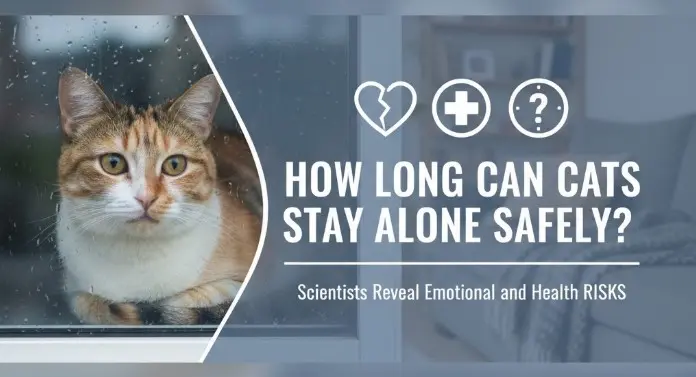Cats are often seen as independent and self-sufficient animals, capable of spending long hours without human company. However, new scientific findings suggest that this popular belief might be misleading. According to recent research published in PLOS ONE, cats experience measurable levels of stress, anxiety, and emotional distress when left alone for extended periods—especially beyond six hours.
The study highlights a critical truth: while cats may not express loneliness in the same way humans or dogs do, their behavior and overall wellbeing are significantly affected by isolation.
The Six-Hour Rule: When Solitude Turns Into Stress
Researchers found that when cats are left alone for more than six hours, they start showing signs of emotional distress and behavioral issues. These signs include:
- Excessive meowing or vocalization
- Scratching furniture or objects destructively
- Urinating outside the litter box
- Reduced appetite and lack of energy
- Withdrawal or depressive behaviors
In fact, over 10% of the cats observed in the study showed symptoms linked to separation anxiety. This indicates that solitude doesn’t just make cats “bored”—it can actually harm their mental health and quality of life.
How Long Is Too Long to Leave a Cat Alone?
The safe duration for leaving a cat alone varies based on its age, health, and personality.
- Healthy adult cats can typically manage short periods of solitude—up to 24 hours, but no more than 48 hours even under ideal conditions.
- Kittens, elderly cats, or those with medical issues require constant care and should never be left alone for extended periods.
- Even with food, water, and a clean litter box, mental stimulation is crucial.
Cats are intelligent and curious creatures that need environmental enrichment. If you have to leave your cat home alone, make sure to provide:
- Interactive toys or food puzzles
- A window perch for outdoor watching
- Cat trees or scratching posts
- Background sounds, like soft music or nature noises, to reduce stress
Do Cats Miss Their Owners? Emotional Bonds Matter
Despite their reputation for independence, cats form deep emotional attachments with their humans. Studies show they recognize their owner’s voice, scent, and daily routines. When these disappear for long periods, cats can feel confusion and distress similar to separation anxiety in dogs.
Cat behaviorist Lisa Nguyen explains:
“A cat’s emotional stability relies heavily on consistent interaction. The bond between a cat and its owner isn’t just about feeding—it’s about communication, comfort, and mutual trust.”
This emotional connection can even influence a cat’s physical health. Chronic stress caused by loneliness has been linked to digestive problems, weakened immunity, and weight changes.
Is Getting a Second Cat the Solution?
Many owners believe that adopting a second cat can solve the loneliness problem. However, experts caution that this isn’t always the case. Cats are territorial animals, and forcing companionship can sometimes create more stress—especially if their personalities clash.
Introducing another cat should be a gradual and supervised process, allowing both animals to adjust slowly. Some cats thrive with a companion, while others prefer having the space to themselves.
The key is to observe your cat’s behavior and provide what makes them most comfortable—whether that’s feline company or more human interaction.
Tips for Cat Owners Who Work Long Hours
If your schedule keeps you away for most of the day, consider these simple strategies to keep your cat happy and relaxed:
- Set up automated feeders and water fountains to maintain routine.
- Play before you leave – interactive playtime can reduce anxiety.
- Use puzzle feeders that reward curiosity and slow down eating.
- Install a pet camera to check in and even talk to your cat remotely.
- Hire a pet sitter or neighbor if you’re gone longer than a day.
Consistency, mental stimulation, and affection are the three pillars of a cat’s happiness—even when you’re not home.
Final Thoughts: Independence Doesn’t Mean Indifference
The myth that cats don’t need people is finally being debunked. Modern science confirms that cats are emotionally complex creatures that rely on their owners for stability, safety, and companionship.
Leaving your cat alone occasionally isn’t harmful—but chronic isolation can be. To ensure your feline friend’s happiness, balance solitude with love, attention, and enrichment.
Remember: a content cat isn’t the one that’s simply fed—it’s the one that feels safe, connected, and understood.

